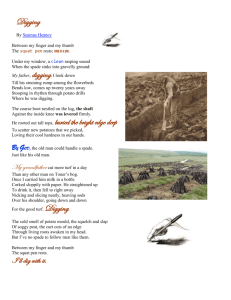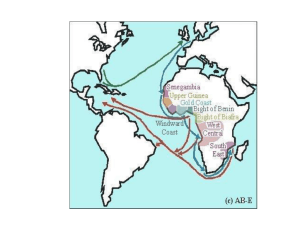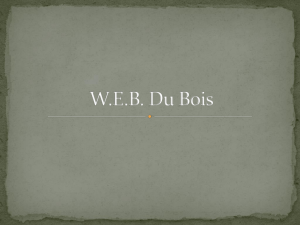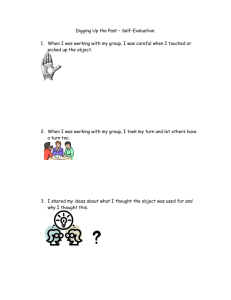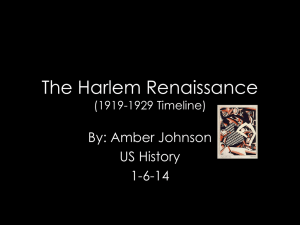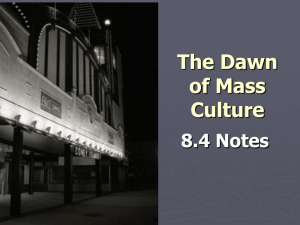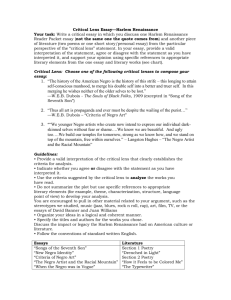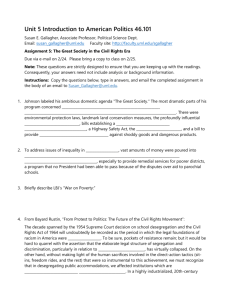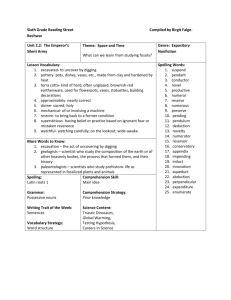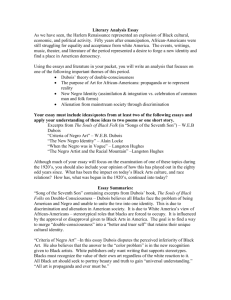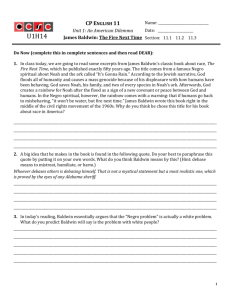Poems and prose passages
advertisement
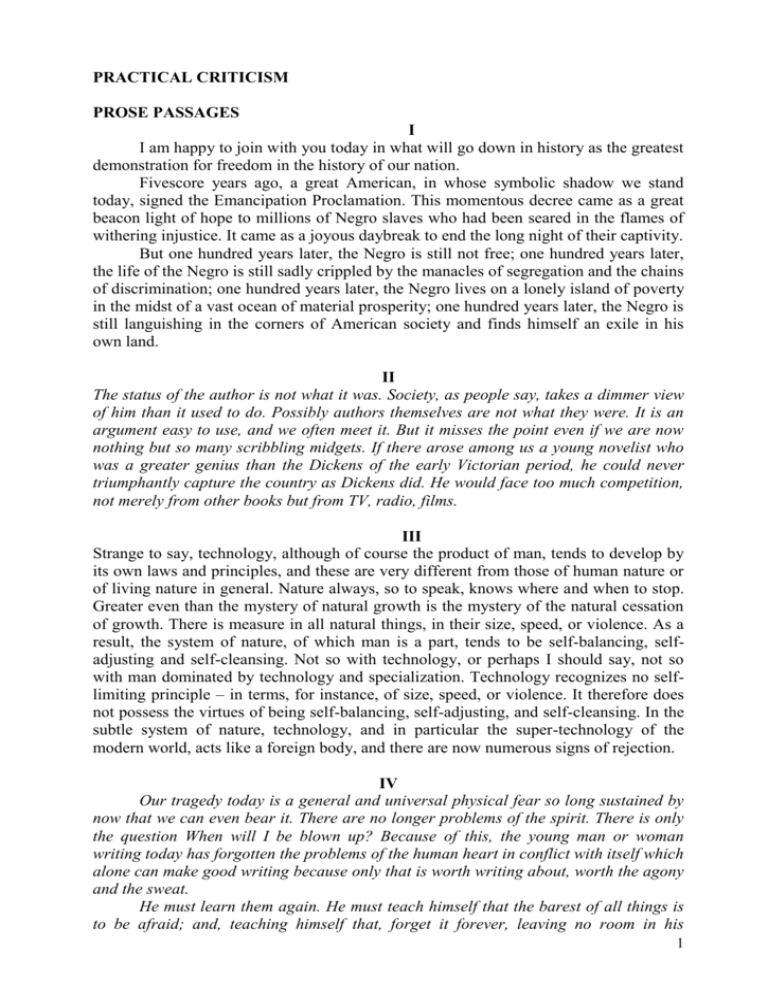
PRACTICAL CRITICISM PROSE PASSAGES I I am happy to join with you today in what will go down in history as the greatest demonstration for freedom in the history of our nation. Fivescore years ago, a great American, in whose symbolic shadow we stand today, signed the Emancipation Proclamation. This momentous decree came as a great beacon light of hope to millions of Negro slaves who had been seared in the flames of withering injustice. It came as a joyous daybreak to end the long night of their captivity. But one hundred years later, the Negro is still not free; one hundred years later, the life of the Negro is still sadly crippled by the manacles of segregation and the chains of discrimination; one hundred years later, the Negro lives on a lonely island of poverty in the midst of a vast ocean of material prosperity; one hundred years later, the Negro is still languishing in the corners of American society and finds himself an exile in his own land. II The status of the author is not what it was. Society, as people say, takes a dimmer view of him than it used to do. Possibly authors themselves are not what they were. It is an argument easy to use, and we often meet it. But it misses the point even if we are now nothing but so many scribbling midgets. If there arose among us a young novelist who was a greater genius than the Dickens of the early Victorian period, he could never triumphantly capture the country as Dickens did. He would face too much competition, not merely from other books but from TV, radio, films. III Strange to say, technology, although of course the product of man, tends to develop by its own laws and principles, and these are very different from those of human nature or of living nature in general. Nature always, so to speak, knows where and when to stop. Greater even than the mystery of natural growth is the mystery of the natural cessation of growth. There is measure in all natural things, in their size, speed, or violence. As a result, the system of nature, of which man is a part, tends to be self-balancing, selfadjusting and self-cleansing. Not so with technology, or perhaps I should say, not so with man dominated by technology and specialization. Technology recognizes no selflimiting principle – in terms, for instance, of size, speed, or violence. It therefore does not possess the virtues of being self-balancing, self-adjusting, and self-cleansing. In the subtle system of nature, technology, and in particular the super-technology of the modern world, acts like a foreign body, and there are now numerous signs of rejection. IV Our tragedy today is a general and universal physical fear so long sustained by now that we can even bear it. There are no longer problems of the spirit. There is only the question When will I be blown up? Because of this, the young man or woman writing today has forgotten the problems of the human heart in conflict with itself which alone can make good writing because only that is worth writing about, worth the agony and the sweat. He must learn them again. He must teach himself that the barest of all things is to be afraid; and, teaching himself that, forget it forever, leaving no room in his 1 workshop for anything but the old verities and truths of the heart, the old universal truths lacking which any story is ephemeral and doomed – love and honour and pity and pride and compassion and sacrifice. Until he does so he labors under a curse. V Here is an old man on the bed of death, harassed with helpless friends and waiting relatives. What a terrible sight it is, this thin frame with loosened and cracking flesh, this toothless mouth on a bloodless face, this tongue that can’t speak, these eyes that can’t see! To this pass youth has come, after all its hopes and trials; to this pass middle age after all its torment and its toil. To this pass health, strength and joyous rivalry; this arm once struck great blows and fought for victory in virile games. To this pass knowledge, science, wisdom. For seventy years this man with pain and effort gathered knowledge; his brain became the storehouse of varied experience, the centre of a thousand subtleties of thought and deed, his heart through suffering learned gentleness as his mind learned understanding; seventy years he grew from animal into man capable of seeking truth and creating beauty. But death is upon him, poisoning him, choking him, congealing his blood, gripping his heart, bursting his brain, rattling in his throat. Death wins. VI To live alone as I have lived, a man should have the confidence of God, the tranquil faith of a monastic saint, the stern impregnability of Gibraltar. Lacking these, there are times when anything, everything, all or nothing, the most trivial incidents, the most casual words, can in an instant strip me of my armour, palsy my hand, constrict my heart with frozen horror, and fill my bowels with the gray substance of shuddering impotence. Sometimes it is nothing but a shadow passing on the sun; sometimes nothing but the torrid milky light of August, or the naked, sprawling ugliness and squalid decencies of streets in Brooklyn fading in the watery vistas of that milky light and evoking the intolerable misery of countless drab and nameless lives. VII Just before Michigan Avenue reached the Hilton, the marchers were halted by the police. It was a long halt. Perhaps thirty minutes. Time for people who had been walking on the sidewalk to join the march, proceed for a few steps, halt with the others, get bored and leave it. Time for someone in command of the hundreds of police in the neighborhood to communicate with his headquarters, explain the problem; time for the dilemma to be relayed, alternatives examined, and orders sent back to attack and disperse the crowd. If so, a trap was first set. The mules were allowed to cross Balbo Avenue, then were separated by a line of police from the marchers, who now, several thousand compressed in this one place, filled the intersection of Michigan Avenue and Balbo. There, clammed by the police on three sides, and cut off from the wagons of the poor people’s March, there, right beneath the windows of the Hilton which looked down on the Grand Park and Michigan Avenue, the stationery march was abruptly attacked. They attacked with tear gas, with mace and with clubs, they attacked like a chain saw cutting wood, the teeth of the saw the edge of their clubs, they attacked like a scythe through grass, lines of twenty and thirty policemen striking out in an arc, their clubs beating, demonstrators fleeing. Seen from overhead from the nineteenth floor, it was like a wind blowing dust, or the edge of the waves riding foam on the shore. 2 POEMS I Woman’s song O move in me, my darling, For now the sun must rise; The sun that will draw open The lids upon your eyes. O wake in me, my darling The knife of day is bright To cut the thread that binds you Within the flesh of night. Today I lose you to find you Whom yet my blood would keep – Would weave and sing around you – The spells and songs of sleep. None but I shall know you As none but I have known; Yet there’s a death and a maiden Who wait for you alone, So move in me, my darling, Whose debt I cannot pay, Pain and the dark must claim you, And passion and the day. II Richard Cory Whenever Richard Cory went downtown We people on the pavement looked at him: He was a gentleman from sole to crown Clean favoured and imperially slim. And he was always quietly arrayed And he was always human when he talked: But still he fluttered pulses when he said “Good Morning” and glittered when he walked. And he was rich – yes richer than a king And admirably schooled in every grace: In fine w thought he was the very thing To make us wish we were in his place. So on we worked and waited for the light And went without the meat, and cursed the bread; And Richard Cory one calm summer night Went home and put a bullet through his head. 3 III My Grandmother’s House There is a house now far away where once I received love. The woman died, the house withdrew into silence, snakes moved among books; I was then too young to read, and my blood turned cold like the moon. How often I think of going there, to peer through blind eyes of windows or just listen to the frozen air or in wild despair, pick an armful of darkness to bring it here to lie behind my bedroom door like a brooding dog… you cannot believe, darling, can you, that I lived in such a house and was proud and loved, I who have lost my way and beg now at stranger’s doors to receive love, at least in small change? IV To My Mother Most near, most dear, most loved, and most far, Under the huge window where I often found her Sitting as huge as Asia, seismic with laughter, Gin and chicken helpless in her Irish hand, Irresistible as Rabelais but most tender for The lame dogs and hurt birds that surround her,She is a procession no one can follow after But be like a little dog following a brass band. She will not glance up at the bomber or condescend To drop her gin and scuttle to a cellar, But lean on the mahogany table like a mountain Whom only faith can move, and so I send O all her faith and all my love to tell her That she will move from mourning into morning. V Stop all the clocks Stop all the clocks, cut off the telephone, Prevent the dog from barking with a juicy bone, Silence the pianos and with muffled drum Bring out the coffin, let the mourners come. Let aeroplanes circle moaning overhead Scribbling on the sky the message He Is Dead, Put crepe bows round the white necks of the public doves, Let the traffic policemen wear black cotton gloves. He was my North, my South, my East and West, My working week and my Sunday rest, My noon, my midnight, my talk, my song; I thought that love would last for ever: I was wrong. 4 The stars are not wanted now: put out every one; Pack up the moon and dismantle the sun; Pour away the ocean and sweep up the wood. For nothing now can ever come to any good. VI Moving in Winter Their life, collapsed like unplayed cards, is carried piecemeal through the snow; Headboard and footboard now, the bed where she has lain desiring him where overhead his sleep will build its canopy to smother her once more; their table, by four elbows worn evening after evening while the wax runs down; mirrors grey with reflecting them, bureaus coffining from the cold things that can shuffle in a drawer, carpets rolled up around those echoes which, shaken out, take wing and breed new altercations, the old silences. VII The Patriot I am standing for peace and non-violence. Why world is fighting fighting Why all people of world Are not following Mahatma Gandhi, I am simply not understanding. Ancient Indian Wisdom is 100% correct, I should say even 200% correct, But modern generation is neglectingToo much going for fashion and foreign thing. Other day I'm reading newspaper (Every day I'm reading Times of India To improve my English Language) How one goonda fellow Threw stone at Indirabehn. Must be student unrest fellow, I am thinking. Friends, Romans, Countrymen, I am saying (to myself) Lend me the ears. Everything is coming Regeneration, Remuneration, Contraception. Be patiently, brothers and sisters. You want one glass lassi? Very good for digestion. With little salt, lovely drink, Better than wine; Not that I am ever tasting the wine. 5 I'm the total teetotaller, completely total, But I say Wine is for the drunkards only. What you think of prospects of world peace? Pakistan behaving like this, China behaving like that, It is making me really sad, I am telling you. Really, most harassing me. All men are brothers, no? In India also Gujaratis, Maharashtrians, Hindiwallahs All brothers Though some are having funny habits. Still, you tolerate me, I tolerate you, One day Ram Rajya is surely coming. You are going? But you will visit again Any time, any day, I am not believing in ceremony Always I am enjoying your company. VIII Digging Between my finger and my thumb The squat pen rests; snug as a gun. Under my window, a clean rasping sound When the spade sinks into gravelly ground: My father, digging. I look down Till his straining rump among the flowerbeds Bends low, comes up twenty years away Stooping in rhythm through potato drills Where he was digging. The coarse boot nestled on the lug, the shaft Against the inside knee was levered firmly. He rooted out tall tops, buried the bright edge deep To scatter new potatoes that we picked, Loving their cool hardness in our hands. By God, the old man could handle a spade. Just like his old man. My grandfather cut more turf in a day Than any other man on Toner's bog. Once I carried him milk in a bottle 6 Corked sloppily with paper. He straightened up To drink it, then fell to right away Nicking and slicing neatly, heaving sods Over his shoulder, going down and down For the good turf. Digging. The cold smell of potato mould, the squelch and slap Of soggy peat, the curt cuts of an edge Through living roots awaken in my head. But I've no spade to follow men like them. Between my finger and my thumb The squat pen rests. I'll dig with it. IX The winter evening settles down With smell of steaks in passageways. Six o’clock. The burnt-out ends of smoky days. And now a gusty shower wraps The grimy scraps Of withered leaves about your feet And newspapers from vacant lots; The showers beat On broken blinds and chimney-pots, And at the corner of the street A lonely cab-horse steams and stamps. And then the lighting of the lamps. The morning comes to consciousness Of faint stale smells of beer From the sawdust-trampled street With all its muddy feet that press To early coffee-stands. With the other masquerades That time resumes, One thinks of all the hands That are raising dingy shades In a thousand furnished rooms. X Indian Women In this triple-baked continent women don't etch angry eyebrows on mud walls. Patiently they sit like empty pitchers on the mouth of the village well 7 pleating hope in each braid of their mississippi-long hair looking deep into the water's mirror for the moisture in their eyes. With zodiac doodlings on the sands they guard their tattooed thighs waiting for their men's return till even the shadows roll up their contours and are gone beyond the hills. XI Marriage Lovers, when they marry, face Eternity with touching grace. Complacent at being fated Never to be separated. The bride is always pretty, the groom A lucky man. The darkened room Roars out the joy of flesh and blood. The use of nakedness is good. I went through this, believing all, Our love denied the Primal Fall. Wordless, we walked among the trees, And felt immortal as the breeze. However many times we came Apart, we came together. The same Thing over and over again. Then suddenly the mark of Cain Began to show on her and me. Why should I ruin the mystery By harping on the suffering rest, Myself a frequent wedding guest? XII Reported Missing Can you give me a precise description? Said the policeman. Her lips, I told him, Were soft. Could you give me, he said, pencil Raised, a metaphor? Soft as an open mouth, I said. Were there any noticeable Peculiarities? he asked. Her hair hung Heavily, I said. Any particular Colour? he said. I told him I could recall Little but its distinctive scent. What do You mean, he asked, by distinctive? It had 8 The smell of woman's hair, I said. Where Were you? he asked. Closer than I am to Anyone at present, I said, level With her mouth, level with her eyes. Her eyes? He said, what about her eyes? There were two, I said, both black. It has been established, He said, that eyes cannot, outside common Usage, be black; are you implying that Violence was used? Only the gentle Hammer blow of her kisses, the scent Of her breath, the ... Quite, said the policeman, Standing, but I regret that we know of No one answering to that description. 9
